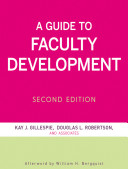« Gillepsie Robertson 2010 » : différence entre les versions
| Ligne 14 : | Ligne 14 : | ||
== 1. Références == | == 1. Références == | ||
* '''Référence complète APA''' : | * '''Référence complète APA''' : Gillespie, K. J. , & Robertson, D. L. (2010). A Guide to Faculty Development. John Wiley & Sons. | ||
<!-- Rappel de la syntaxe : | <!-- Rappel de la syntaxe : | ||
| Ligne 27 : | Ligne 27 : | ||
<br> | <br> | ||
== 2. Copies == | == 2. Copies == | ||
Version du 30 mai 2012 à 12:59
A Guide to Faculty Development
1. Références
- Référence complète APA : Gillespie, K. J. , & Robertson, D. L. (2010). A Guide to Faculty Development. John Wiley & Sons.
- Auteur(s) : Kay Gillespie, Douglas Robertson
2. Copies
- Copie électronique en ligne : /
- Copie électronique locale : /
- Copie physique CP : /
- Copie physique en bibliothèque :
3. Mots-clés
4. Quart de couverture
Since the first edition of "A Guide to Faculty Development" was published in 2002, the dynamic field of educational and faculty development has undergone many changes. Prepared under the auspices of the Professional and Organizational Development Network in Higher Education (POD), this thoroughly revised, updated, and expanded edition offers a fundamental resource for faculty developers, as well as for faculty and administrators interested in promoting and sustaining faculty development within their institutions. This essential book offers an introduction to the topic, includes twenty-three chapters by leading experts in the field, and provides the most relevant information on a range of faculty development topics including establishing and sustaining a faculty development program; the key issues of assessment, diversity, and technology; and faculty development across institutional types, career stages, and organizations.
"This volume contains the gallant story of the emergence of a movement to sustain the vitality of college and university faculty in difficult times. This practical guide draws on the best minds shaping the field, the most productive experience, and elicits the imagination required to reenvision a dynamic future for learning societies in a global context."
5. Résumé (facultatif)
